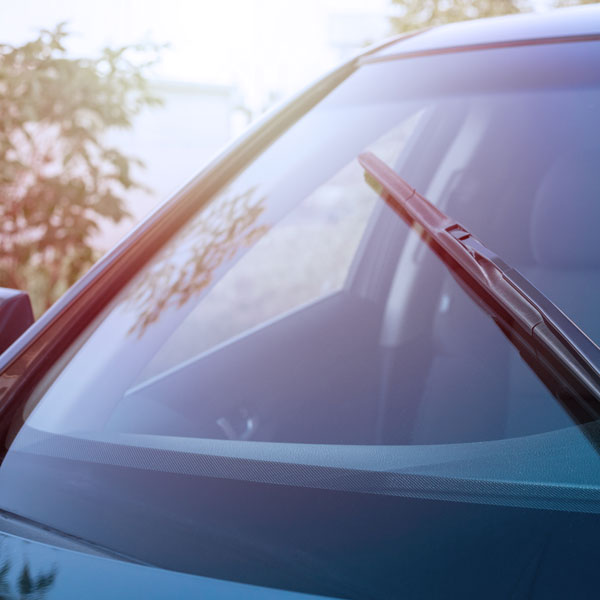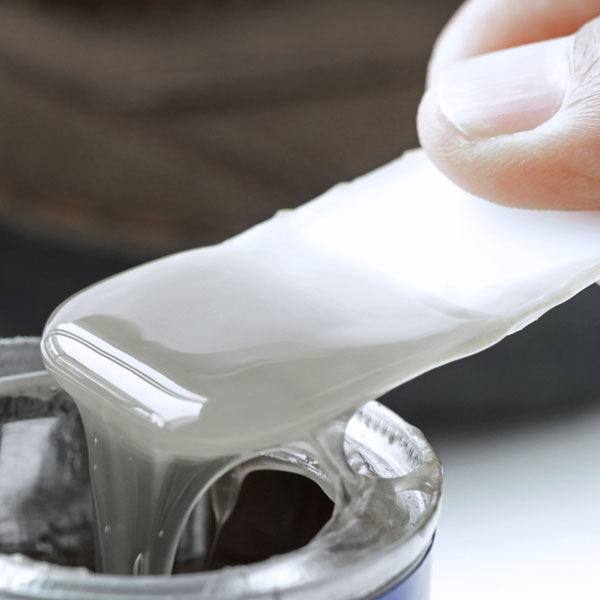Automotive
Be it in tires, performance parts for cooling systems, or brake pads, we are helping to make sure cars meet the sustainability requirements of tomorrow.
Baypren® is a leading solution for the production of highly stressed rubber articles in many sectors, primarily in the automotive industry, mechanical engineering, plant construction, shipbuilding, mining, and mineral oil production. Articles made from appropriately formulated Baypren® compounds are suitable for moldings and extrudates of all kinds, such as reinforced hoses, roll covers, and belts.
The Baypren® portfolio for adhesive applications consists of two product lines, differing in their rate of crystallization. The fast crystallizing 300 grades give contact adhesives with high initial strength, high final strength and a rapid bond formation. These adhesives are especially useful in industries with fast production cycles like the shoe industry. In cases where a high initial bond strength is not needed (e.g. flooring or roofing applications), the medium fast crystallizing Baypren® grades of the 200 line can be used.

Baypren® displays the following characteristic properties in addition to its excellent rubber-elastic behavior:
- resistance to weathering, both in dry and humid climates
- excellent combustion behavior
- good aging and heat resistance
- good tensile strength, tear and wear resistance
- high dynamic fatigue resistance
- resistance to water and a large number of chemicals over a long period
- good adhesion to reinforcing substrates consisting of textiles, metals or glass fibers
- resistance to fungi and soil bacteria
- low gas permeability
Thanks to its excellent set of properties, Baypren® is being used for the production of highly stressed rubber articles in many sectors, primarily in the automotive industry, mechanical engineering, plant construction, ship-building, mining and mineral oil production. The properties of Baypren® vulcanizates are influenced by the type of modification of the raw polymer, either by pre-crosslinking, sulfur modification or xanthogen disulfide (XD) modification. With the correct formulation, finished products made of Baypren® display the characteristic outstanding properties in addition to their excellent rubber-elastic behavior.
- Aging and heat resistance: Baypren® vulcanizates stabilized with an optimized antioxidant system, display excellent aging resistance. They neither soften nor harden at high temperatures or over long periods of stress and remain elastic and useable. The heat resistance of Baypren® vulcanizates is considerably better than that of natural rubber vulcanizates. It also exceeds the heat resistance of nitrile rubber.
- Weathering and ozone resistance: While vulcanizates produced from many other rubbers tend to crack and harden relatively quickly and degrade when exposed to weathering and/or ozone, properly compounded Baypren® vulcanizates do not exhibit any significant deterioration, even after many years of exposure to atmospheric influences such as light, UV, rain, industrial gases, ozone and oxygen. Weathering experiments in an ozone athmosphere show that technical rubber goods based on Baypren® display sufficient elasticity for the majority of static applications (for example structural profiles) even after 50 years of continuous operations.
- Resistance to water and chemicals: Baypren® vulcanizates are resistant to water, acids, alkaline solutions and a large number of industrial chemicals. With a good resistance to hydrocarbons, Baypren® vulcanizates show sufficient performance in contact with mineral oils to make them suitable for many applications. The corresponding volume change in mineral oils decreases with increasing naphthenic and, in particular, paraffinic content of the oil. Baypren® vulcanizates have a swelling resistance that is considerably better than that of vulcanizates based on styrene-butadiene rubber, natural rubber or ethylene-propylene diene rubber.
- Resistance to fungi and bacteria: Technical rubber goods that are in contact with soil for long periods of time are susceptible to be attacked by soilborne bacteria and fungi. In the long term, this can lead for example to destroyed underground cables. In contrast to the majority of other rubber types, Baypren® displays superior resistance to these microorganisms. This resistance can be enhanced through suitable compounding.
- Abrasion resistance: Baypren® vulcanizates are highly wear-resistant. Their abrasion resistance is similar to that of nitrile rubber.
- Resilience: Properly formulated Baypren® vulcanizates feature very good resilience, although they do not attain the level of natural rubber. Very good resilience values are achieved in vulcanizates with a relatively high hardness.
- Dynamic fatigue resistance: Baypren® vulcanizates are highly resistant to dynamic fatigue. Special grades are available to meet extremely stringent specifications, such as those applied to drive belts. For these grades the loss factor and hence the heat build-up under dynamic load are particularly low.
- Deformation properties: Baypren® vulcanizates have a low compression set over a wide temperature range. The low-temperature compression set is a key value employed in the assessment of vulcanizates for use in seals. At higher temperatures, where aging also plays a role, the compression sets are lower than those of a large number of other elastomers.
- Combustion behavior: Baypren® vulcanizates can be compounded for improved combustion behavior. The inherent flame retardancy of the polymer itself means that even stringent end-user specifications can be met. Limiting oxygen index (LOI) values above 50% can be attained with Baypren®. For example demanding specifications for flame retardant conveyor belts in underground mining applications can easily be met by properly compounded Baypren®.
- Low-temperature flexibility: The glass transition temperature of Baypren® polymers remains fairly constant almost irrespective of the polymers’ tendency to crystallize. The brittleness temperature and the glass transition temperature of Baypren® vulcanizates can be reduced to below -50°C by an appropriate compound formulation. Where rubber parts made of Baypren® are required to remain flexible at low temperatures over long periods, grades with a low crystallization tendency are recommended.
- Electrical properties: Baypren® is highly suitable for cable sheathing and, in many cases, for low-voltage insulation. It is recommended for the use in cables that must have an excellent weathering, ozone, oil and aging resistance as well as a good flame retardance. The thermal conductivity and coefficient of thermal expansion of Baypren® vulcanizates are comparable with other elastomers. The values obtained are, of course, largely influenced by the compound formulation. The thermal insulation is also similar to that of the majority of plastics used in the construction industry today.
Main application industries
- Building and wire & cable industry: rubber-sheathed flexible cables for heavy-duty applications, trailing cables for use in dry and wet conditions and also in underground applications where service conditions are severe, welding cables, flat flexible lighting cables
- Automotive and general industry: hoses, molded parts, conveyor and transmission belts

The Baypren® portfolio is consisting of two product lines, distinguished by their rate of crystallization. The 300 grades are crystallizing more readily and are reaching a higher final degree of crystallization than the 200 grades. Within both product lines different grades with varied viscosities (chain lengths) are available, to allow the choice of the best suiting raw material for the distinct application.
- Fast crystallizing 300 grades: The fast crystallizing 300 grades are giving contact adhesives with high initial strength, high final strength and rapid bond formation. These adhesives are especially useful in industries with fast production cycles like the shoe industry. Due to the high initial strength, production processes following the bonding step can be done at once. The joined substrates can be handled immediately, without waiting for the final setting of the adhesive.
- Medium fast crystallizing 200 grades: In cases where high initial bond strength is not needed (e. g. flooring or roofing) the medium fast crystallizing Baypren® grades of the 200 range can be used. They prolong the open time of the adhesives, enhancing processing reliability and give a softer, more flexible bond line. The medium fast crystallizing Baypren® grades can be used both on their own or in combination with fast crystallizing Baypren® grades. Additionally the blending of grades of different viscosities is without problem, allowing the formulation of an adhesive with well-fitting viscosity and crystallization for the distinct application.
ARLANXEO’s polychloroprene is a polymer made from the monomer 2-chloro-1,3-butadiene. It is produced by state-of-the-art processes with over 60 years of experience. Good resistance against ozone and oxidative stress, excellent solubility in many organic solvents and solvent mixtures, as well as a high rate of crystallization make it ideal for the production of solvent based contact adhesives. Contact bonding requires the application of the adhesive on both substrates. After brief surface drying the substrates are joined with pressure within the open time (contact bonding time) of the adhesive. One of the most prominent features of adhesives based on Baypren® is the high initial strength that is established instantly with joining. The bonded substrates can be handled immediately, fixation of the substrates until the cure is finalized is not needed. The initial strength as well as the open time can be influenced by the pressure during bonding. The higher the pressure, the higher is the initial strength and the longer is the contact bonding time.
Following momentary strength, crystallization of the polychloroprene further increases cohesion, resulting in a final bond strength, that exceeds the adhesion strength achievable with contact adhesives based on natural or nitrile rubber by far.
Apart from their simple, economical processing, contact adhesives based on Baypren® are distinguished by their excellent adhesion to a wide range of materials. Additionally they allow formation of soft bond lines for the joining of flexible substrates like rubber, foamed material or leather.
Main application industries
The demand for contact adhesives based on Baypren® is particularly high in the shoe industry, in fabrication of mattresses, in furniture production, in the construction and automotive industry and in the do-it-yourself sector.
Do you need further information about our products and their applications or regulatory declarations? You can also use the contact form for any questions about career opportunities at ARLANXEO, media enquiries and other topics.
Get in touchBe it in tires, performance parts for cooling systems, or brake pads, we are helping to make sure cars meet the sustainability requirements of tomorrow.
Inconspicuous but indispensable – synthetic rubber does valuable work in machinery and technical equipment.